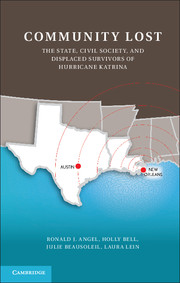Book contents
- Frontmatter
- Contents
- Acknowledgments
- Introduction
- 1 After the Storm
- 2 An Emerging Methodology for a Crisis Situation
- 3 Life before the Storm
- 4 Evacuation and Arrival in Austin
- 5 The Limited Transportability of Social Capital
- 6 Civil Society, NGOs, and the Grassroots Response
- 7 Housing, Employment, and Identification
- 8 Health Care and the Limitations of Civil Society
- 9 The State, Civil Society, and the Limitations of Social Capital
- Bibliography
- Index
9 - The State, Civil Society, and the Limitations of Social Capital
Published online by Cambridge University Press: 05 June 2012
- Frontmatter
- Contents
- Acknowledgments
- Introduction
- 1 After the Storm
- 2 An Emerging Methodology for a Crisis Situation
- 3 Life before the Storm
- 4 Evacuation and Arrival in Austin
- 5 The Limited Transportability of Social Capital
- 6 Civil Society, NGOs, and the Grassroots Response
- 7 Housing, Employment, and Identification
- 8 Health Care and the Limitations of Civil Society
- 9 The State, Civil Society, and the Limitations of Social Capital
- Bibliography
- Index
Summary
In this book, we have focused on the response by federal and state agencies to the human crisis that resulted from Hurricane Katrina, as well as the role of civil society organizations in dealing with the short- and longer-term needs of individuals and families who were displaced by the storm. We are interested, though, in more than just this one disaster or even the role of civil society in responding to short-term crises. Rather, we focused on this particular event and the diaspora that it brought about for the survivors in order to address the question of whether local levels of government and especially civil society organizations can address the short-term and the longer-term structural vulnerabilities of marginalized groups. The question was motivated by the popular desire to shrink the federal government that has informed public policy in recent years. Our investigation revealed multiple legal, bureaucratic, logistic, and human barriers to a rapid and effective response to the crisis, and in particular it revealed deep-seated barriers to the longer-term return of certain individuals and groups to any semblance of self-sufficiency and stable community life. Civil society organizations, including secular nongovernmental and faith-based organizations, were active in multiple ways even before FEMA arrived in Austin, but their impact and effectiveness varied greatly depending on their structure, funding, staffing, and the tasks they addressed.
We end by asking what contributed to the mixed results and what might be done to make civil society organizations more central and effective contributors to the mission of crisis intervention, as well as the longer-term project of poverty alleviation and minority group empowerment. We also discuss factors that create or undermine social capital, a term that we have used to refer to the capacity of communities to act collectively to improve their members’ life chances and well-being. Our focus in the previous chapters was not on the recovery and rehabilitation efforts in New Orleans. Rather, it was on those hurricane victims who evacuated to Austin, Texas, and who remained for some time. It became clear early in the study that some of the survivors whom we interviewed would never return to New Orleans and that they had, in effect, permanently relocated to Texas. A few of the survivors we interviewed were middle-class and possessed high levels of human and social capital.
- Type
- Chapter
- Information
- Community LostThe State, Civil Society, and Displaced Survivors of Hurricane Katrina, pp. 192 - 210Publisher: Cambridge University PressPrint publication year: 2012



